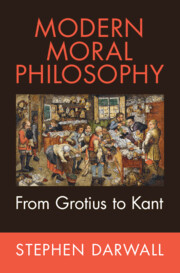Book contents
- Modern Moral Philosophy
- Modern Moral Philosophy
- Copyright page
- Dedication
- Contents
- Preface
- Acknowledgments
- Introduction
- 1 Grotius
- 2 Hobbes and Pufendorf
- 3 Locke and Cumberland
- 4 Spinoza, Cudworth, Shaftesbury, and Leibniz
- 5 Hutcheson and Butler
- 6 Hume and Smith
- 7 The British Rationalists and Reid
- 8 Rousseau and Kant
- Works Cited
- Index
8 - Rousseau and Kant
Published online by Cambridge University Press: 10 June 2023
- Modern Moral Philosophy
- Modern Moral Philosophy
- Copyright page
- Dedication
- Contents
- Preface
- Acknowledgments
- Introduction
- 1 Grotius
- 2 Hobbes and Pufendorf
- 3 Locke and Cumberland
- 4 Spinoza, Cudworth, Shaftesbury, and Leibniz
- 5 Hutcheson and Butler
- 6 Hume and Smith
- 7 The British Rationalists and Reid
- 8 Rousseau and Kant
- Works Cited
- Index
Summary
No philosopher is more strongly associated with deontological ethics or is a more canonical modern moral philosopher than Immanuel Kant. In this chapter, we focus on Kant, though we begin, after a brief introduction of Kant and his historico-philosophical significance, with Rousseau. Rousseau is best known as a political philosopher, but there are elements of his thought that have great importance for moral philosophy and its history and, especially, for Kant. Kant credits Rousseau as the source of his signature claim of the equal dignity of rational persons. And Rousseau’s conception of political society as an “association” that “defend[s] and protect[s] the person and goods of each associate with the full common force,” but where each “nevertheless obey[s] only himself,” has obvious resonances with Kant’s “kingdom of ends” in which all are governed by self-legislated law. At the same time, Rousseau offers important points of contrast to Kant. Whereas Rousseau’s emphasis is essentially social and political, Kant will attempt to argue for morality as a common law binding all agents that is grounded in practical reason alone. Rousseau, by contrast, points toward an alternative grounding in sociability that is reminiscent more of Grotius, Pufendorf, Smith, and Reid.
Keywords
- Type
- Chapter
- Information
- Modern Moral PhilosophyFrom Grotius to Kant, pp. 269 - 342Publisher: Cambridge University PressPrint publication year: 2023

